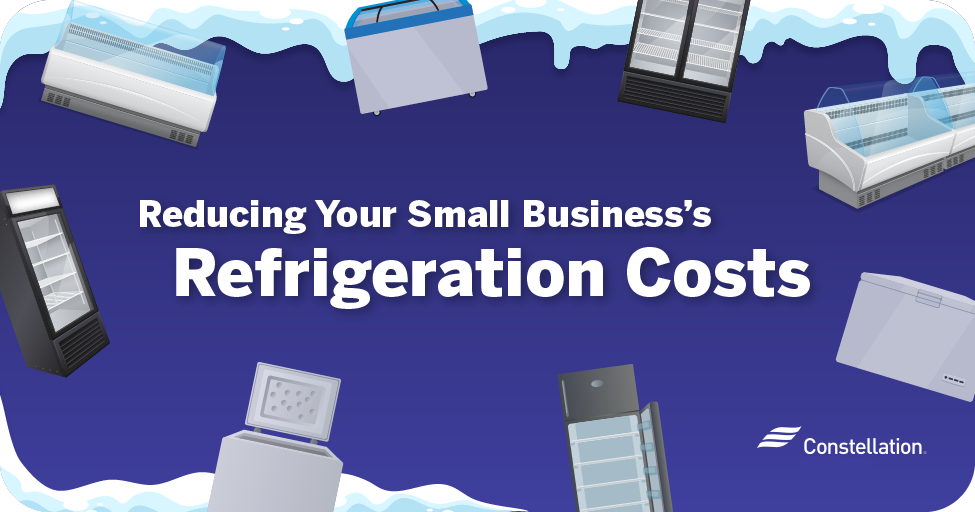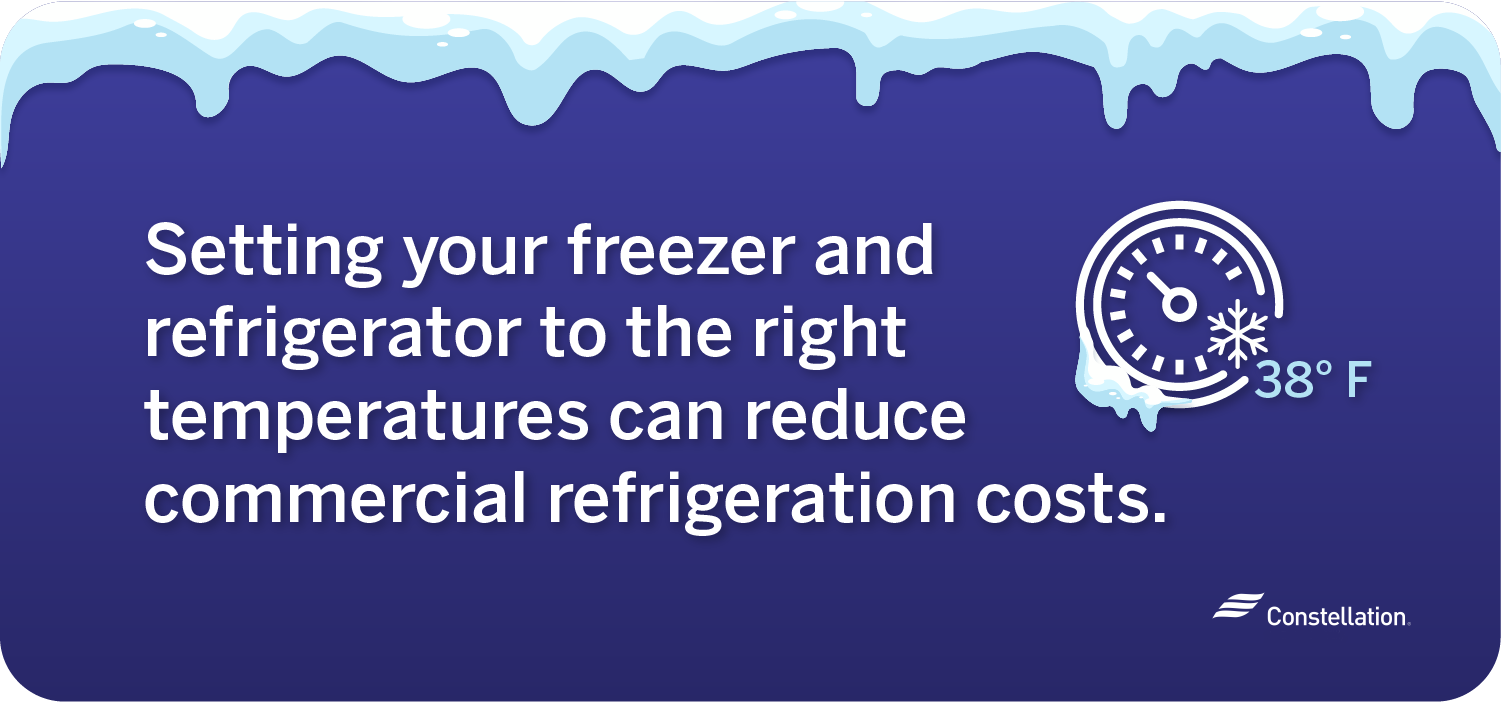
- Category:
Small Business Energy Savings -
Last updated:
March 28, 2022
Reducing Your Small Business’s Refrigeration Costs
Many businesses could potentially improve the bottom line if they could only reduce commercial refrigeration costs. But that isn’t always easy. You often have to balance display and access needs with food safety, space considerations and costs.
Despite those challenges, though, there are ways to keep commercial refrigeration expenses under control and help profitability. What’s more, being more efficient is good for the environment and, therefore, for your business reputation. Here, we’ll discuss some factors that contribute to refrigeration costs, ways to maintain your equipment and refrigeration tips that can trim your bills.
How much does it cost to run a commercial freezer and refrigerator?
The cost of running a commercial freezer or refrigerator only starts with the purchase price. You’ll also need to factor in the total cost of ownership, such as installation, preventative maintenance, service and repairs, and, of course, commercial refrigerator electric usage. And coming up with an estimate of how long your commercial refrigerator will last can give you an idea of how much it will cost to run a commercial refrigerator over its total lifetime.
Determining your business’s refrigeration expenses
Figuring out the inputs for how much it costs to run a commercial freezer or refrigerator is pretty straightforward in most cases. Add up the cost of your service contract and individual service calls, maintenance expenses and how much you have paid for filters and replacement parts.
The cost of energy is a little trickier. If you saved the Energy Guide label that came with your appliance, you’re a step ahead. If you don’t have it, find the model number for your refrigerator and search the manufacturer’s website to get the information you need.
The Energy Guide label provides an estimate of annual electricity usage measured in kilowatt-hours (kWh). Multiply that number by the rate you pay for electricity and divide by 12 to get your monthly cost.
7 ways to reduce commercial refrigeration costs
You can cut your commercial refrigerator electric usage by following the following refrigeration maintenance tips and energy-saving ideas. Also investigate small-business energy efficiency tools. A refrigerator in optimum working order will last longer, further improving your overall return on investment.
1. Ensure your evaporator and condenser coils are working properly.
You can reduce commercial refrigeration costs by checking your evaporator and condenser coils. Dust and grease frequently collect on them, reducing their ability to produce cold air. Keeping them clean and working properly keeps your unit running efficiently, using less electricity and lengthening the appliance’s useful life.
2. Replace old or outdated refrigeration equipment.
So, how long do commercial refrigerators last? The answer is that they could run for a very long time — but that doesn’t mean you should run your appliance until it fails. Old refrigerators and freezers are much less energy-efficient, elevating your energy costs every day you run them.
Since the early ‘90s, the ENERGY STAR® program has been designating the most energy-efficient appliances you can buy, providing detailed information about power usage. The cost of replacing old equipment with energy-efficient commercial refrigerators could possibly be outweighed by savings from lower electricity bills. If you don’t have ready cash, a small-business equipment loan is an option to consider.
3. Set your freezer and refrigerator to the right temperatures.
Food and Drug Administration (FDA) and United States Department of Agriculture (USDA) regulations specify that food requiring refrigeration must be stored below 40 F. Higher temperatures can lead to bacteria growth. Lower is better — but the closer you approach freezing (32 F), certain food items can be damaged. Make sure to consult FDA guidance for the specific food you’re storing, but generally, setting your commercial refrigerator at around 38 F will keep you in the safe zone without overly taxing your unit.

To be safe, commercial freezers need to maintain a temperature at or below 0 F. However, the exact temperature you set will depend on what you’re freezing and what kind of appliance you’re using. Walk-in freezers need to be kept a little colder than reach-in freezers to maintain a safe temp. And ice cream freezers must be kept coldest of all, maintaining a temperature of at least -5 F, according to ENERGY STAR®. Once you determine the maximum safe temperature for your specific unit and food type, you can conserve some energy by staying a degree or two under it.
4. Upgrade your defrost controls.
Another way to reduce commercial refrigerator costs is to make the defrost cycle more efficient. Sensors in modern appliances measure the pressure drop in the evaporator, as well as the amount of humidity — and thus frost — accumulating in the unit. Instead of running on a timer, they start a defrost cycle only when needed or demanded by the sensor, hence the term “demand controls.”
5. Install energy-efficient light fixtures.
You need light in your refrigerator, but what kind of light makes a big difference. An old-fashioned incandescent bulb throws off 90% of the energy it consumes as heat.
While that is wasteful in any situation, it’s worse in your refrigerator. Your compressor may have to work harder to compensate for the heat your old bulbs are producing. Switching to LED and other energy-efficient lighting options eliminates both forms of energy waste.
6. Get your employees involved.
Keeping refrigerator doors closed, opening them only when strictly needed, can reduce energy usage, because your condenser doesn’t have to switch on to cool warm air that flows in when doors are open. Reminding employees to keep doors closed with energy-saving office etiquette signs enlists the help of every employee.
7. Schedule regular maintenance for your refrigeration unit.
The complexity of today’s refrigerators and freezers mean that preventative maintenance often needs to be done by a professional. You risk causing damage or voiding your warranty if your do-it-yourself maintenance practices go wrong. Most companies find it is easier and less risky to hire a professional to handle all maintenance work.
Refrigeration maintenance tips for your small business
Although it’s often better to get professional help maintaining your equipment, you may be able to perform some of the following tasks on your own:
- Keep your condenser coil clean. Built-up dirt makes your unit work harder for longer, burning more energy than efficient operation would.
- Regularly check your refrigeration unit’s air filters. Air filters clogged with dirt are inefficient and could damage critical components. Keeping them clean and replacing them often eliminates this problem.
- Check seals around doors. Tears, gaps and warps can let warm air in — almost as much over time as leaving the doors open.
- Load in cold items right away. It’s easier to keep cold items cold than burning energy to bring warm items down to low or freezing temperatures.
- Keep fluid pressures optimized. Higher pressures increase the efficiency of various components.
- Manage humidity and frost. Sensors and controls that constantly adjust to prevent frost are more efficient than timer-based methods.
- Add variable compressor pressure controls. These adjust based on outside conditions, extending the life of your unit as you save energy.
- Replace lights with energy-efficient bulbs. Remove heat-emitting bulbs and replace them with LED and other low-heat options.
- Upgrade fans. If you can’t replace an entire unit, you can often save significant energy by replacing old fans with energy-efficient models.
- Buy equipment certified as ENERGY STAR®. Replace old equipment with new high-efficiency models.
To stay profitable, a small business needs to track what they pay for utilities and try to keep that amount under control. Refrigeration is a significant expense for many businesses, particularly when it comes to energy consumption. Better equipment efficiency means using less energy and reduced commercial refrigeration costs, improving your bottom line as well as preserving the environment.




